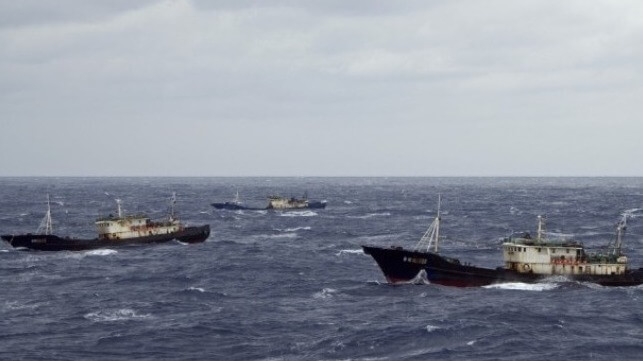Alarm Over Unabated Fishing by Foreign Ships in South Atlantic Waters

A collation of environmental groups joined by representative from the maritime industry contend that the South Atlantic waters are under siege from foreign vessels carrying out unregulated fishing activities. They are cautioning that the activities are now threatening to deplete stocks, a development that risks instigating a major environmental catastrophe and negatively impact livelihoods of regional fishers.
The International Transport Workers’ Federation (ITF) joined the efforts warning that an environmental catastrophe is looming in the South Atlantic. They are calling attention to foreign vessels descended on the waters off the Argentinian borderline where they believe unabated over-fishing activities are at their peak.
ITF reports that overfishing by foreign ships from China, South Korea, Taiwan, Spain and other countries in the area off Argentina known as Mile 201 is threatening fish stocks. Though Argentina regulates fishing up to 200 nautical miles from its Exclusive Economic Zone (EEZ), the region east of that is unregulated and has become a hotspot for large-scale operations.
“Because it’s done beyond the region of the Atlantic regulated by Argentina, this fishing is not technically illegal. However, there is a clear obligation under the United Nations Convention on the Law of the Sea for states to reach agreements to manage fish stocks. That simply hasn’t happened here,” said Chris Williams of the ITF Fisheries Section.
ITF now wants countries whose ships are fishing in the region to urgently come together with Argentina and agree on precautionary quotas. “Otherwise, we fear important fish species will be wiped out and no one will be able to make a living fishing there,” noted Williams.
Unregulated fishing in the South Atlantic high seas is at their peak owing to the fact that it is the only region of the world’s oceans without a functioning UN regional fisheries management organization. Negotiations to create such a body are greatly complicated by the long-running territorial dispute between Argentina and the UK over the Malvinas/Falkland Islands which sit on the southern edge of the disputed region.
It is estimated that over the last fifteen years, the number of fishing vessels in the region has doubled with Chinese ships alone increasing from 271 in 2020 to 375 in 2021, according to data from the Argentine Naval Prefecture. With the increased overfishing, stocks of fish particularly squid and hake are becoming depleted.
A report by NGO Oceana shows that every year, vessels from distant-water fleets crowd together along Argentina’s EEZ to take advantage of the lucrative fishing grounds due its tremendous abundance and diversity of marine life, including more than 330 types of finfish, nearly 120 deepsea species, and a variety of invertebrates. Commercial fishermen target approximately 60 to 70 of the species, including the Argentine shortfin squid that makes up the second-largest squid fishery in the world, with half of the global catch coming from Argentina’s EEZ.
Argentinian authorities have repeatedly said that most of the ships take advantage of being just beyond the arm of its law and engage in a range of illegal, unreported and unregulated (IUU) fishing practices. Last year, the Argentine Navy deployed two offshore patrol vessels to monitor the international fishing fleet traveling close to its borderline en route to the South Atlantic.
The Oceana report shows that between January 1, 2018, and April 25, 2021, over 800 fishing vessels conducted nearly 900,000 hours of apparent fishing within 20 nautical miles of the invisible border between Argentina’s national waters and the high seas.

that matters most
Get the latest maritime news delivered to your inbox daily.
During the period, there were over 6,000 instances in which fishing vessels appeared to go “dark” by potentially disabling their AIS electronic tracking devices. The vessels’ activities were hidden for over 600,000 hours with nearly 66 percent of the “dark” vessels being Chinese flagged squid jiggers.
Argentina largely depends on the commercial fishing industry which produces $2.7 billion in economic impact and constitutes 3.4 percent of the country’s gross domestic product.
